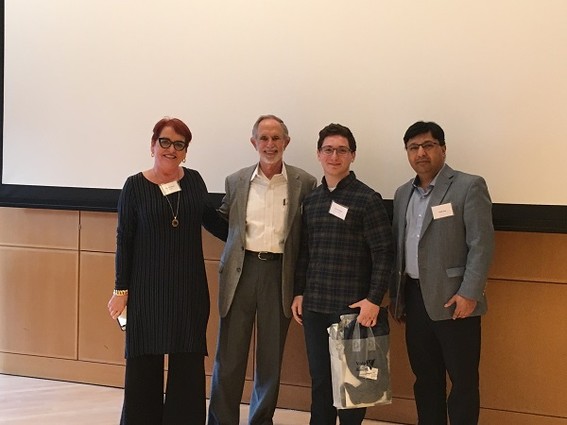Teams from Stevens, Princeton and NJIT Win Posters, Pitches and Prizes Event

At the New Jersey Entrepreneurial Network’s Posters, Pitches and Prizes event, held on April 11 this year, 21 hopeful entrepreneurs set up posters and pitched to investors.
The winners were:
- Best Pitch: “MiraView,” presented by C.J. Internicola, cofounder and CEO of MiraSaves, based at Stevens Institute of Technology.
- Best Poster: “Noninvasive Glucose Sensing Based on Mid-Infrared Laser Spectroscopy,” presented by a team from Princeton University.
- Audience Choice: “Optimization of an Overall System Wide Configuration of a Hybrid Drone Delivery System,” presented by a large team from NJIT.
NJTechWeekly.com interviewed Internicola, who presented MiraView, his company’s digital therapeutic system for PTSD symptoms. The system begins with a personal assistant for the patients called “Mira,” he explained. “Think Siri for PTSD therapeutics. Mira will ground the patients and talk to them when they are experiencing a flashback or anxiety attack. The app helps them journal what is going on with their symptoms and what is going on in their everyday life.”
MiraView will also generate an actionable patient report that the doctor can view on the cloud, he told us. The doctor will know what to talk about and be better able to identify trends. Internicola noted that he had been conducting focus groups on this solution since he had started college, a few years ago. The company works out of the Stevens Venture Center, in Hoboken.
We also spoke with two members of the team that won the Audience Choice award: Durga Prasad Ramaswamy, an NJIT senior, and Sevilay Onal, an industrial engineering instructor at NJIT. “We are working on a last-mile delivery problem: the delivery of packages from a local hub to people’s homes,” said Onal. Ramaswamy noted that customers generally want delivery in one night, but delivery can take a long time. “We are trying to solve this using drones and vans,” he said.
The solution involves a delivery van that can transport special light-weight drones. While a postal worker is delivering mail to houses on a particular street, these drones can fly to residences on that street or nearby to deliver packages. Other people have been working on similar projects, but they’re focusing on deliveries made one by one from a warehouse, so they need super-strong drones, said Onal and Ramaswamy. “We are launching them from on top of a van, so they can go about a mile and then meet up with the van,” Onal added. The drones can lift up to five pounds.
Another presenter at the event was Timothy D. Gill, who showed a poster for his fledgling startup, SetSee (Maplewood). “I’ve always been an information geek, and I care about information,” he said. “When the web search came along, I was delighted. However, I noticed that when web searching started, searches changed.” Gill said that people used to search within documents to find items: “Small search, I call it.” But he noted that although people can find sites or documents on the web, when they get the content on their screens, they have problems” finding the useful information within. “I think of it as the last-mile problem for information seeking.” SetSee brings the power of searching to the content that is displayed on the screen, Gill explained. Conceptually, his search method works with anything that is in a display.
Venkat Krishnan, founder of PVin Corp, which does business as Global Comply Solutions (Princeton), presented a poster called “Software Applications for CRS (Common Reporting Standards) and FATCA (Foreign Accounts Tax Compliance Act) Compliance & Reporting.” He told us that this fintech company helps banks and other financial institutions provide tax information to government regulators. “The biggest problem governments have worldwide is tax innovation. When the responsibility to report is given to individuals or business entities, they are not always honest. So, governments worldwide are shifting the responsibility to financial institutions.”
Periodically, banks, mutual funds and brokers have to report to tax regulators on an individual’s or firm’s bank deposits and other assets. Tax regulators such as the U.S. Internal Revenue Service then cross-check this information with the reports from the individuals or firms themselves. Global Comply Solutions has developed combined software, as well as a consulting solution to scale the software. “Now we are going with risk and compliance consultants in various countries who only provide consulting services,” said Krishnan. The goal is to convince these consultants to use the company’s software and data-specialist services. The company intends to keep its costs low by staffing local teams in those countries.
[This article was edited on 5/6/18 to correct some inaccuracies.]

